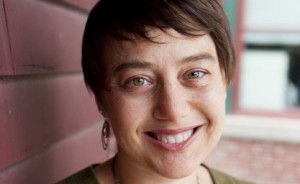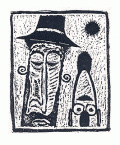Life and Action

Idit Klein. “Within the Jewish community we have the opportunity, much like Esther, to take action through visibility “
Purim’s Power: Despite the Consequences –The Jewish Push for LGBT Rights, Part 3
This Purim, I’m reminded of the power of coming out and speaking out, despite the consequences. In the story of Purim, the Jewish people are redeemed only after Esther finds the courage to stand up for herself and her community.
Editor’s Note: This article originally ran as part of ZEEK’s 2014 series about the Jewish push for LGBT rights.
Love Sustains: How My Everyday Practices Make My Everyday Activism Possible
The world needs awake, alive, engaged people whose work to mend the world is grounded in and inspired by love. The world needs people who somehow keep their hearts open and pliable while they look unflinchingly at our broken systems and work to change them.
Sounds nice, I know. Actually doing it for any length of time, though, is damn hard.
Ten Things You Should Know About ZEEK & Why We Need You Now
At ZEEK Magazine, we work each week to develop and lift up emerging and established Jewish voices on social change, spirituality, arts and culture. We delight in the intersections and new ideas that make this landscape feel vibrant and make cultural shifts and social change possible.
We’re a small magazine, but we think what we do is important. We hope that you do, too.
A ZEEK Hanukkah Roundup: Act, Fry, Give, Sing, Laugh, Reflect, Plan Your Power, Read
Feel like you’re doing it wrong? Or maybe you’re just ready to make this Hanukkah even better? Let us help. Check out ZEEK’s guide to Hanukkah. We’ve got ideas to light up the next eight nights — whatever kind of Jew-ish you are, from A(ctions) to Z(EEK).
Call for Submissions! Write about Resistance!
This Chanukah, ZEEK will run an intergenerational series celebrating resistance and the future of the Jewish left in the United States.
Send original pitches, personal essays, reported articles, chatty opinion pieces, feature stories, and creative nonfiction to zeek@zeek.net, with “RESISTANCE” in the subject line. Deadline for pitches is November 26.
Afterthoughts: Making Memory Matter after the Ferguson Weekend of Resistance & Sukkot
As I chanted along with the leaders, “We young, we strong, we marching all night long,” I remembered that remembering is holy, but only if the remembering leads us to a better reality….. And in that moment I knew that the fight will take a long time, but that it is built on love, and that is why it will win.
On Despair and Hope: A Jewish Call for Climate Action
It’s an unusually cool late July night in Philadelphia. I’ve just returned home from a planning meeting with a group of Jews organizing to join the upcoming People’s Climate March, taking place September 21 in New York City. The march is expected to be historic, and coincides with the latest UN Climate Summit. Though I’m not much of an organizer, and tend to get impatient at committee meetings, I left that meeting feeling something I haven’t felt in a long time when it comes to climate change: hope.
Morning Jew: Lady Parts, Princesses & Funerals
Get behind the headlines with comics Heather Gold and Katie Halper. This week, the comic duo talk about women’s bodies and take a fresh look at that super-loaded ‘80s-girl stereotype: The Jewish American Princess, but also their male counterparts.
Leftist Ethicist: Advice to Help “Offset” Gentrification in Chicago
My husband and I are thinking about buying a property in Chicago, but we are in a bit of a quandary. Knowing that we will be gentrifying, we would like to “offset our footprint” if you will, like one might offset one’s carbon footprint by planting a tree or carpooling. Are there ways to “offset our footprint”?
Not Just Another World Cup Special with Morning Jew
The Morning Jew Duo Mouths Off About the Bite Felt Round the World & More
Katie Halper and Heather Gold tackle the headlines in this World Cup special edition: Suarez’s big mouth, a Dutch soccer team with a Hava Nagila ringtone, and even a Theresienstadt tie-in – no joke. But very funny.
New Depths in Jewish-Muslim Dialogue: Jewish Privilege
I’m deeply invested in the transformative possibilities of Jewish-Muslim engagement. But until those of us with privilege recognize the inequity and take steps to fix it, the disparity in our circumstances can get in the way of conversation.
Lessons From the Field: Community Organizing vs. Community Building
Over the past decade, community organizing has become a buzz phrase in American culture –- embraced by the right and the left. As a grassroots organizer-turned-rabbi, I have dedicated much of the past eight years to trying to figure out the relationship between organizing and community building — and how the two might best support each other. Right now, congregations and community organizing groups have a lot to learn from each other.
ZEEK PRESENTS: Shavuot & Social Change--June 3 in NYC
ZEEK PRESENTS Shavuot & Social Change with Zeek editor Erica Brody, writer-activist Sarah Seltzer, and Marjorie Dove Kent of Jews for Racial and Economic Justice.
How can Shavuot help us think more creatively and deeply about what it means to be a Jewish change-maker in New York? Zeek editor Erica Brody, writer-activist Sarah Seltzer, and activist and Marjorie Dove Kent of Jews for Racial and Economic Justice team up to lead this highly interactive conversation/workshop. This is our first public event since we relaunched!
Activist, Parent: An Organizer's Look at Change-Making, Time and Life Through the Lens of Motherhood
I used to work in a church basement with community activists. We wore worn T-shirts, worked until 10 pm, and wore our spunkiness with pride. No one, at that time, was a parent. Then I joined a big healthcare labor union, where many members, staff and leaders were parents. We’d often have conference calls at 9 pm or later to accommodate bedtime. At organizing meetings, kids ran around as their parents were figuring out the best strategic ways to win their union.
Plight of a Mentor: Cutthroat Vs. Collaborative for NextGen Women Leaders: The Leftist Ethicist
I am a senior staff member at a progressive Jewish nonprofit with many young(er) staff people. I am a mentor for a few women who are early in their careers. In my organization, there are many women, but men still occupy most of the top positions. I sometimes find myself encouraging cutthroat attitudes that I don’t really believe in because I know it is part of what these young women will need to advance. Is this ethical? —Mentoring Against My Values
Inequality between men and women in the Jewish communal world is a hot issue, especially around pay and leadership, two issues I’m sure you discuss with your mentees. READ MORE
On No-Phone Zones & Balance while Fighting for Change, Families, Equity & Reproductive Choice
I remember clearly the day that my then-boyfriend now-husband and I implemented our “no conference calls on road trips” rule. We’re often on the road between our home in DC and New York or to my mother-in-law’s home on the Delaware coast. While this might seem like an obvious rule to some in order to maximize quality time together, our concerns were much more mundane. If we were both on the phone at the same time, we couldn’t hear. And we couldn’t agree on whose call was more important, so we decided no one could be on the phone.
Broken Justice and the Death Penalty: A Q & A with Jen Marlowe, Co-author of "I Am Troy Davis"
“I was horrified at what I assumed at that time was a very unusual situation. I thought it was an aberration. Only later did I realize how typical his case was. But so many aspects of what made his case problematic are emblematic of our death penalty system and our criminal justice system.” –Jen Marlowe on writing “I Am Troy Davis”
Hate Speech, Identity & the Importance of Asking Questions — Part 2: The Jewish Push for LGBT Rights
AuthorsI was the victim of hate speech. I will never forget the day. It was nothing if not shocking. I am openly gay, a Jewish man — a rabbi — who wears a yarmulke in public. Amidst a crowd of people, from all walks of life, I was told to leave.
A t this point I probably should say that the establishment where this hate speech took place was a gay bar. And the man who insisted I leave was gay. And also Jewish.
Am I a Racist? Tackling the Tensions of an Inclusive Multiracial Jewish Community
Earlier this month, a few brave Jews made a trek to the middle of Brooklyn. I know what you’re thinking, what’s so brave about Jews in Brooklyn? They were brave not only to venture outside during an ice storm, but also because they knew they would be spending the evening talking about privilege and race in the Jewish community at the Jewish Multiracial Network (JMN) Parlor Meeting. The question: Am I racist?
A-Listers for a Cause, Relative Creepiness, and Ethical Realtors: The Leftist Ethicist
Dear Leftist Ethicist, I have a distant family member who has turned from a C-list to an A-list celebrity because of a role on a popular TV show. We hardly know each other. I am a passionate employee of a grassroots organization and would like to ask him to support us. He is apolitical as far as I know, but probably leans conservative. What is the best way to approach him without being creepy? Or is it even worth reaching out since we’re pretty removed?
![[the current issue of ZEEK]](../../image/2/100/0/5/uploads/leftistethicistgraphic-52842c6a.png)
- 5000 Pages of Zeek
- Founded in 2001, Zeek was the first Jewish online magazine, and we have over 5000 pages online to prove it, all available free of charge. Read more in the Archive.

















